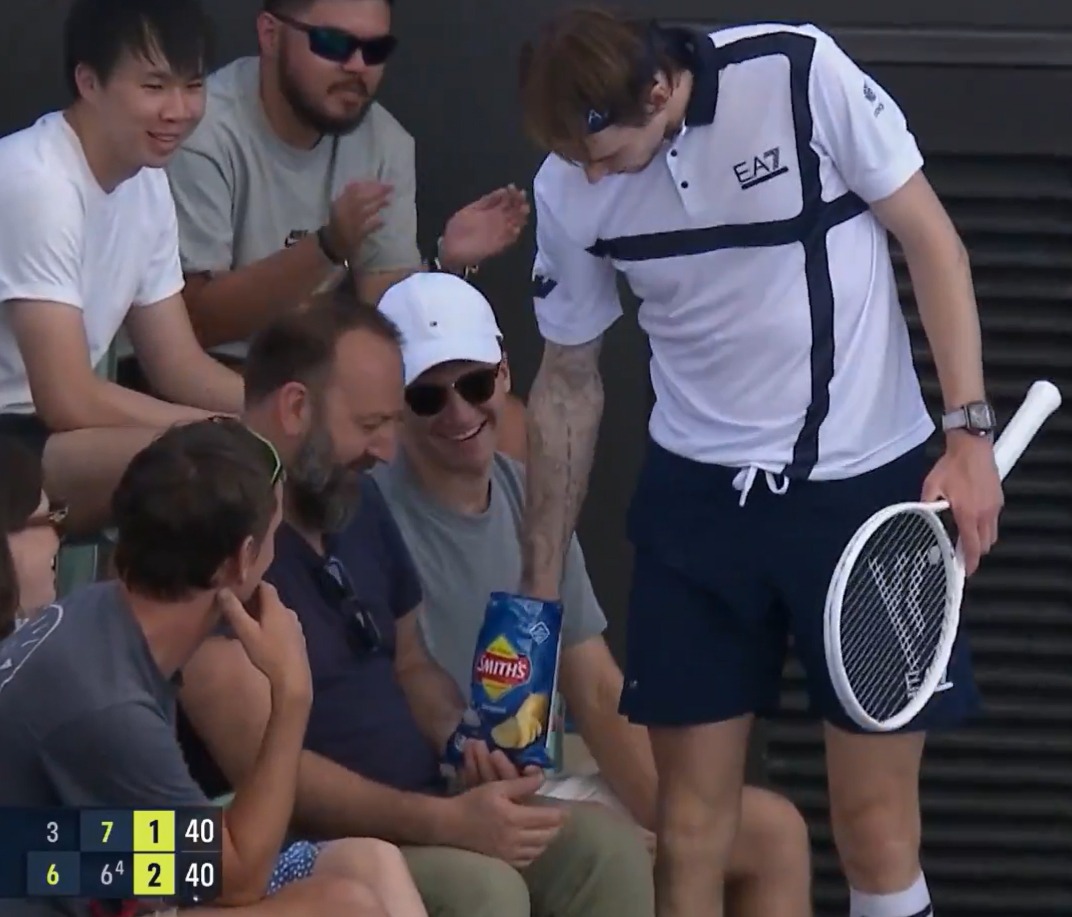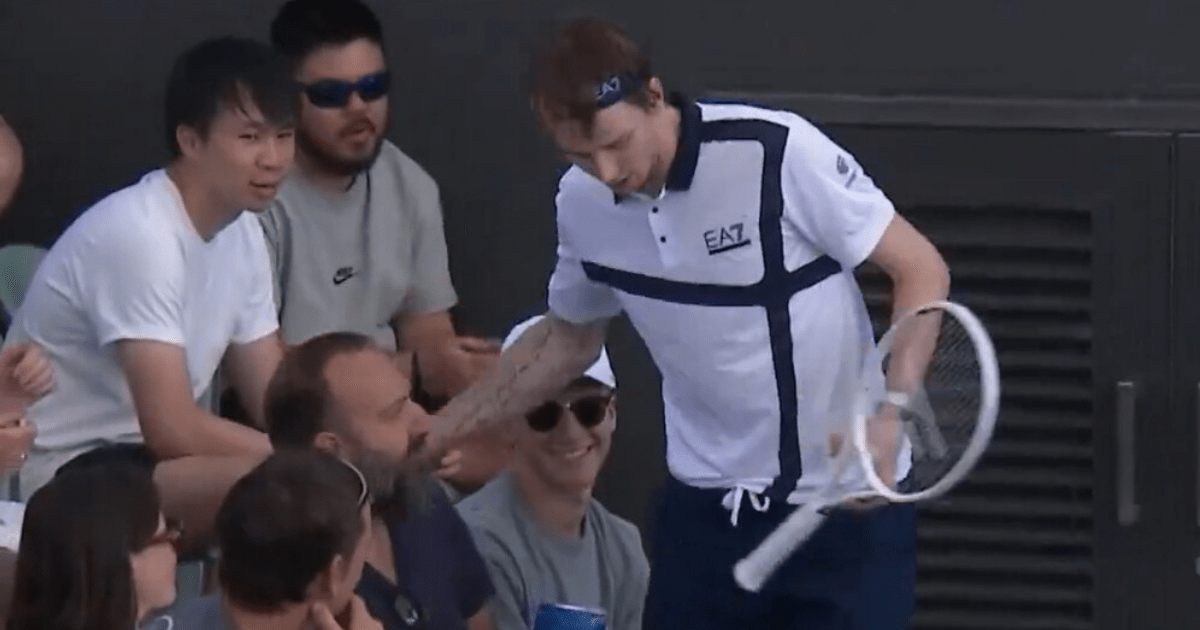'BRILLIANT' Alexander Bublik left tennis fans in stitches after eating a spectator’s crisps.
Unorthodox Kazakhstani tennis player, Alexander Bublik, has once again entertained fans with his wild antics. During a thrilling quarter-final match at the Australian Open in Adelaide, Bublik found himself in the front row of the crowd after chasing down a shot. Seizing the opportunity, he playfully helped himself to a fan's packet of crisps, much to the amusement of spectators.
Unconventional Display of Humor
Bublik's spontaneous act of snacking mid-match caught everyone off guard. As he leaped over a small wall and landed in the front row, he noticed a fan munching on crisps. In a light-hearted moment, Bublik tapped the fan on the shoulder and cheekily took a few crisps for himself. The incident garnered plenty of laughter and positive reactions from the crowd and even the TV commentator, who described it as "brilliant."
Positive Reactions and One Tennis Scrooge
The humorous incident earned praise from tennis fans and viewers. One person exclaimed, "You can't make this stuff up!" while another declared their love for Bublik's freewheeling nature. However, there was one salty critic who believed the act was against fair play and should be penalized, claiming that tennis is a gentlemen's sport.
Bublik's Success and Quirky Past
Despite the unconventional snacking break, Bublik managed to save a match point and went on to win the match. He will now face Jack Draper in the semi-finals. This isn't the first time Bublik has made headlines for his eccentric behavior on the court. In the past, he has hit shots with the handle of his racket, destroyed multiple rackets in a moment of frustration, and faced criticism for alleged disablist comments during a match. Nevertheless, Bublik's unique personality continues to captivate fans and make tennis matches all the more entertaining.

Frequently Asked Questions
What type of support team is needed by a top-level tennis player?
A top-level tennis player will need a powerful support team if they want to compete at high levels. The team will typically include a head trainer to oversee the training and technical development of the player, a fitness coach for physical conditioning and injury prevention, a medical professional or physiotherapist for injury management and prevention, a sports psychology specialist for mental coaching and a nutritionist for diet advice. The team can include a hitting partner, manager, agent and sometimes even a stringer. This allows the player to focus solely on his game.
How do mental and psychological aspects factor into tennis training?
Tennis players must be mentally and psychologically fit. The player must be able to control stress, maintain concentration, and manage the emotional highs, and lows, of competition. Many players use techniques such as mental rehearsals, visualization and goal-setting. A sports psychologist can assist players in building resilience, developing coping strategies to deal with pressure, and elevating their mental game so that it matches their physical prowess.
What role plays video analysis in training top tennis athletes?
Video analysis can be a valuable tool to train and develop top tennis players. It allows for a detailed review of techniques, tactics, match play, and opponent patterns. Video analysis allows coaches and players alike to review strokes in detail, identify areas for improvement, strategize and plan against future opponents. It also aids in recognizing habits and tendencies that may go unnoticed during the heat of competition, enabling more targeted and efficient practice sessions.
What is a typical tennis player’s daily training routine?
The daily training regimen of a top tennis player is both rigorous and meticulously structured. It can include several hours of training on the tennis court. This includes technical drills as well as tactical practice and match play scenarios. The players will also take part in a fitness program designed to increase their strength, flexibility, and endurance. This includes stretching, massages, or other recovery techniques such as physiotherapy. Proper nutrition and psychological coaching are also integral components, ensuring athletes maintain peak performance both physically and mentally.
How important are nutrition and diet in training to become an elite tennis player?
Nutrition and diet are vital for any athlete aiming to perform at the highest level, and tennis players are no exception. Appropriate dietary intake supports intensive training by providing the necessary energy, facilitating recovery, and reducing the risk of injuries. The diet of an elite athlete is typically a mixture of carbohydrates and proteins with vitamins and essential minerals. A good fluid balance will help you avoid fatigue and keep your concentration high during the game.
Statistics
- Approximately 70% of a professional tennis player’s training time is devoted to developing technique and on-court strategies.
- Strength and conditioning coaches emphasize core strength, noting that an increase in core stability can improve shot accuracy by up to 43%.
- Statistical trends indicate that top tennis players usually have at least 5 people in their support team, including coaches, fitness trainers, and physiotherapists.
- Engaging in structured video analysis sessions has been shown to improve a player’s tactical decision-making by approximately 35%.
- On average, it’s estimated that only 1 in 5000 high-level junior tennis players will develop into internationally ranked professionals.
External Links
optimumtennis.net
tennisfitness.com
usta.com
itftennis.com
atptour.com
How To
Tennis Mental Toughness: How to improve it
A multifaceted approach is required to increase mental toughness while playing tennis. Set clear and attainable goals, then measure your progress towards them. Use visualization techniques to mentally practice match situations and how you will respond to them. Focus on deep breathing and mindfulness to stay calm and focused under pressure. During matches and training, you should focus more on the procedure than the final result. You will be able to maintain a regular routine. Consider setbacks as opportunities to learn and develop strategies for coping with them. Work with a sports psychologist or coach. To increase your mental resilience, regularly expose yourself to high pressure situations.

